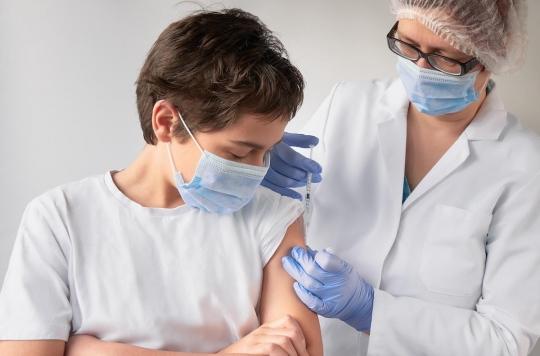A study points out that vaccines would expose boys aged 12 to 15 to more side effects than the virus. These results should be put into perspective since they relate to a pre-variant Delta observation period.

- The rate of myocarditis after two injections of the Pfizer/BioNTech vaccine is 162.2 cases per million for healthy boys aged 12 to 15.
- The risk of a healthy teenager being hospitalized with Covid-19 is 44 per million.
- In France, where the vaccination of children from the age of 12 began on June 15, few cases of myocarditis have been identified.
The question of childhood vaccination continues to be debated. Countries adopt positions that vary, ranging from the extreme Cuban which began to vaccinate its population from the age of 2 to the extreme British which has so far not authorized those under 16 to receive vaccine doses. A recent analysis of medical data conducted by American researchers from the University of California, and prepublished on September 8 in the journal medRxiv, says that boys aged 12 to 15 are more exposed to the side effects of the Pfizer vaccine than to those of Covid. Results to be put into perspective because the period observed dates from before the Delta variant which changed the epidemic situation due to its very high contagiousness.
Higher risks in boys
According to reviews of existing data, the Pfizer vaccine puts boys aged 12 to 15 at four to six times the risk of being diagnosed with myocarditis than with Covid-19 infection. This side effect, which remains rare, occurred following symptoms felt in the days following the second injection. According to the authors, approximately 86% of affected boys required hospitalization.
Researchers analyzed adverse reactions to Covid vaccines in American children aged 12 to 17 during the first half of 2021. The rate of myocarditis after two injections of the Pfizer/BioNTech vaccine stands at 162.2 cases per million for healthy boys aged 12-15 and 94 cases per million for healthy boys aged 16-17. For girls, these rates are 13.4 and 13 cases per million, respectively. According to current US data, the risk of a healthy teenager being hospitalized with Covid-19 is 44 per million.
In France, few cases of myocarditis
In France, where the vaccination of children from 12 years old began on June 15, few cases of myocarditis have been identified in this category of the population. The rate of myocarditis in France after the Covid vaccination was only 3-4 cases per million doses of the Pfizer/BioNTech vaccine. Again, cases of myocarditis appeared after the second injection. For now, 68% of 12-17 year olds have received a dose of vaccine and 56% have completed their vaccination schedule.
Rethinking the vaccination strategy for children?
These results should be put into perspective because at the time the data were collected, the Delta variant was not the majority. Its high contagiousness, and therefore the increased risk of hospitalization that follows, suggests that the benefit/risk balance observed in children could be reversed.
Be that as it may, this study is important enough to reflect on the vaccination strategy for children. “Although myocarditis after a vaccination is exceptionally rare, we may be able to modify the first or second dose or combine the vaccines differently to avoid any risk, once we better understand the physiologysays Saul Faust, professor of pediatric immunology and infectious diseases at the University of Southampton. All in all, there is no medical rush to vaccinate children, although if schools are unable to maintain education for the vast majority at all times, the overall balance could change. If my two teenage children are offered the vaccine, my GP wife and I will not hesitate to allow them to receive it..”

.

















